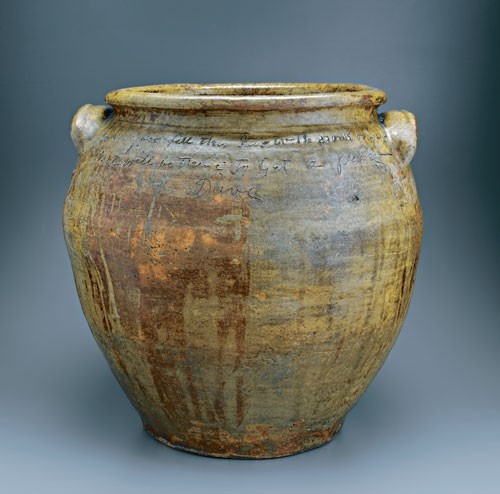
Storage jar, Lewis Miles pottery, 1858. Alkaline-glazed stoneware. H. 25 5/8". Incised in script at shoulder: “This jar is to Mr Segler who keeps the bar in orange burg / for Mr Edwards a Gentleman—who formly kept Mr thos bacons horses / April 21 1858”; on opposite shoulder: “When you fill this jar with pork or beef / Scot will be there to get a peace,— / Dave” and twenty-five short slashes (two rows of ten and one of five). (Courtesy, Arthur Goldberg; unless otherwise noted, all photos by Gavin Ashworth.)
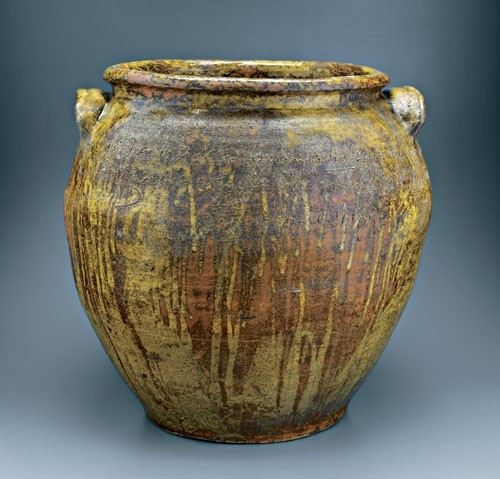
Reverse side of the storage jar illustrated in fig. 1.

Detail of a portion of the poem and Dave’s signature on the shoulder of the storage jar illustrated in fig. 1.
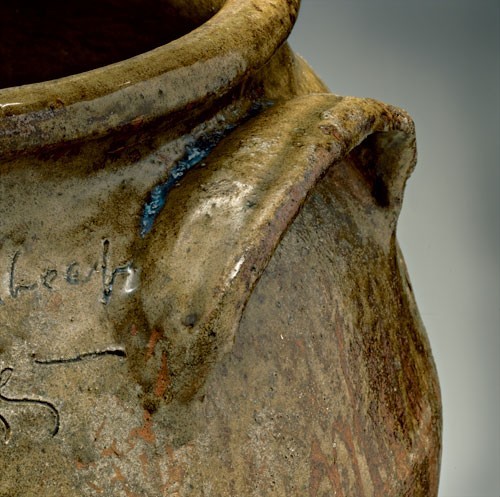
Detail of the rim and one of the large lug handles of the storage jar illustrated in fig. 1. Note blue rutile between the rim and handle.
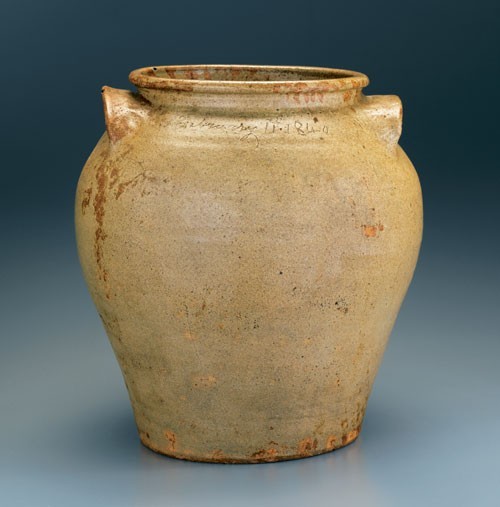
Jar, Lewis Miles pottery, 1840. Alkaline-glazed stoneware. H. 14 1/2". Incised in script at shoulder: “Mr. L. Miles Dave”; on opposite shoulder: “February 11th · 1840” plus two slash marks and five punctates. (Courtesy, Arthur Goldberg).
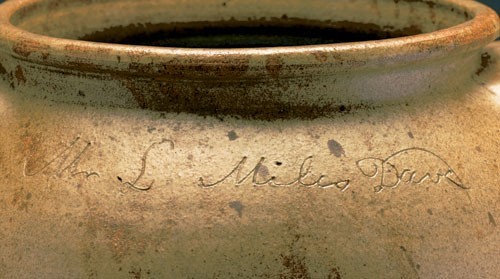
Detail of the inscription and signature on the shoulder of the storage jar illustrated in fig. 5.
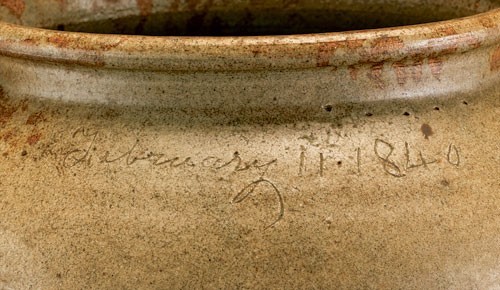
Detail of the incised date on the shoulder and the punctates under the rim of the storage jar illustrated in fig. 5.
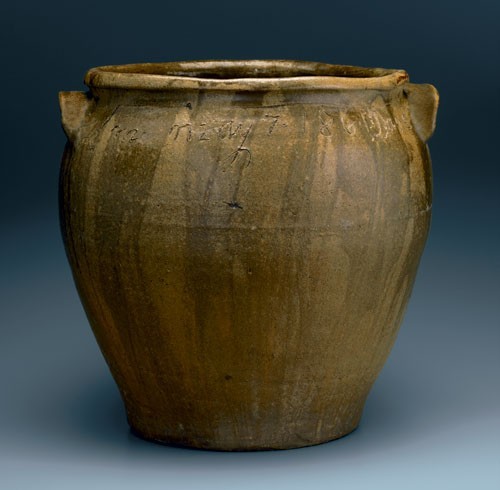
Storage jar, Lewis Miles pottery, 1861. Alkaline-glazed stoneware. H. 17 1/4". Incised in script on shoulder: “Lm May 7. 1861 Dave”; on opposite side: two slash marks. (Courtesy, Arthur Goldberg.)
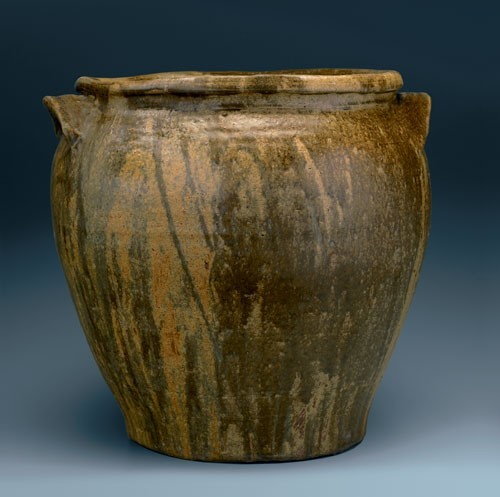
Reverse side of the storage jar illustrated in fig. 8.
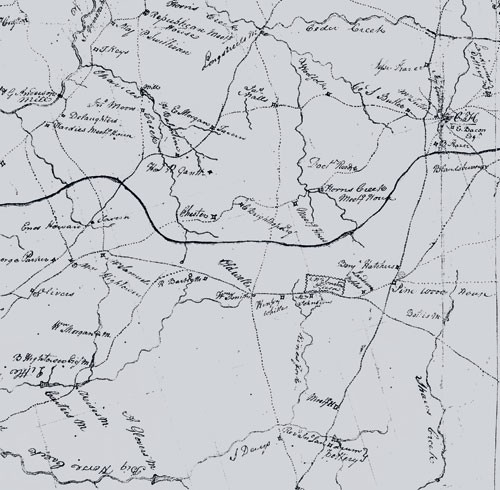
Detail, “A Map of the District of Edgefield,” December 1816, by Thomas Anderson, D.S. (Courtesy, South Carolina Department of Archives and History, Columbia.) This map was later revised and published in the Robert Mills Atlas of the State of South Carolina (1825). The circled areas show the [Abner] Landrum pottery, CH [Edgefield Courthouse], the Rev. Jn. Landrum pottery, and Big Horse Creek.
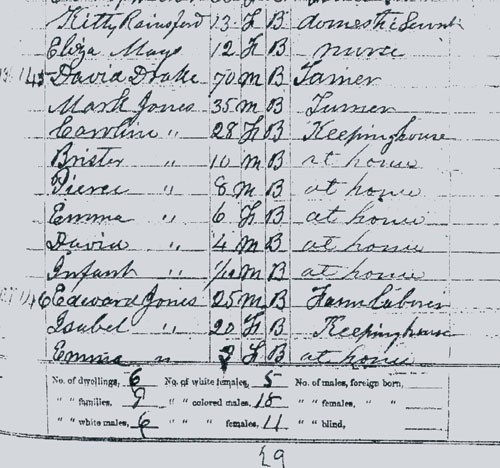
Detail of the 1870 Federal Census, Population Schedule, South Carolina, showing Dave and Mark Jones and his family in the same household.
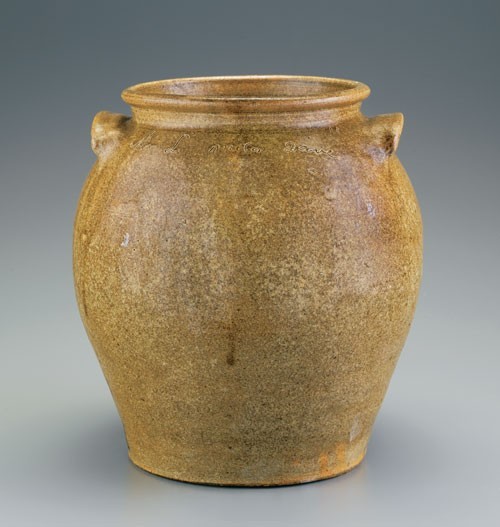
Storage jar, Lewis Miles pottery, 1840. Alkaline-glazed stoneware. H. 13". Incised in script at shoulder: “Mr. L miles Dave" and two slash marks; on opposite shoulder: “20th Nov 1840” and four punctates. (Courtesy, James Witkowski.)
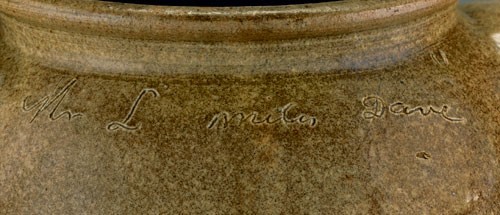
Detail of the inscription and signature, followed by two slash marks, on the shoulder of the storage jar illustrated in fig. 12.
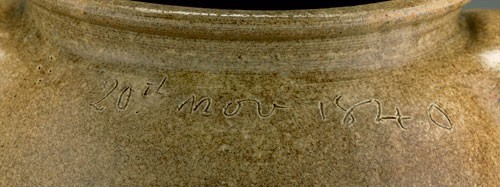
Detail of the four punctates and incised date on the shoulder of the storage jar illustrated in fig. 12.
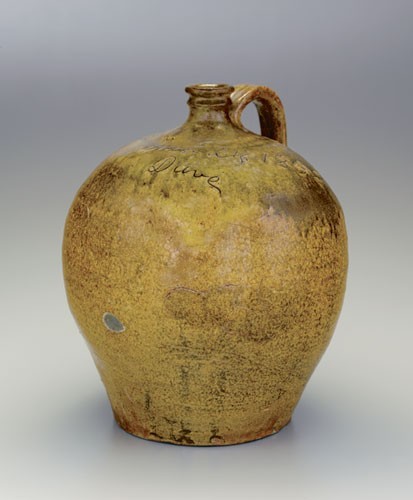
Jug, Lewis Miles pottery, 1858. Alkaline-glazed stoneware. H. 14 1/2". Incised in script: “Lm Feb 24 1858 Dave”; two slash marks and three punctates. (Courtesy, James Witkowski.)
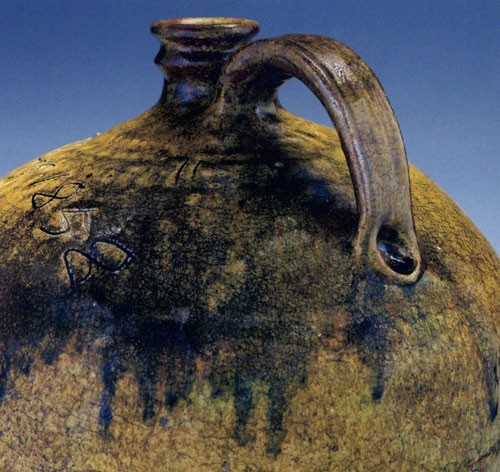
Detail of the handle of the jug illustrated in fig. 15. Note the top of the handle attached at the spout base, the characteristic collar, and the pronounced “thumbprint” at the base of the handle.
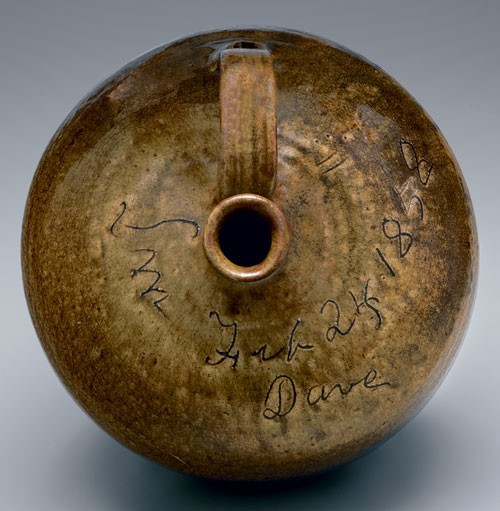
Top view of the jug illustrated in fig. 15.
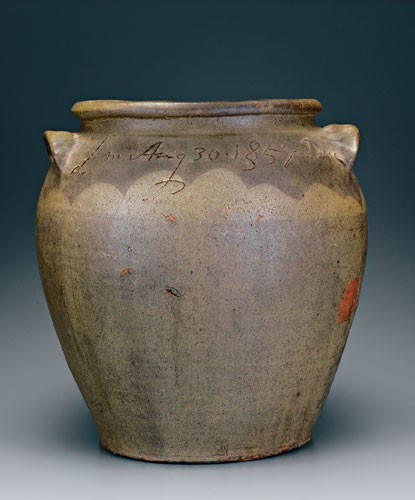
Storage jar, Lewis Miles pottery, 1857. Alkaline-glazed stoneware. H. 19 1/4". Incised in script on shoulder: “Lm Aug 30 1857 Dave”; on opposite side: two slashes with ten punctates. (Courtesy, James and Mary Smith.) Note the unusual effect produced by pouring additional glaze around the shoulder of the vessel.
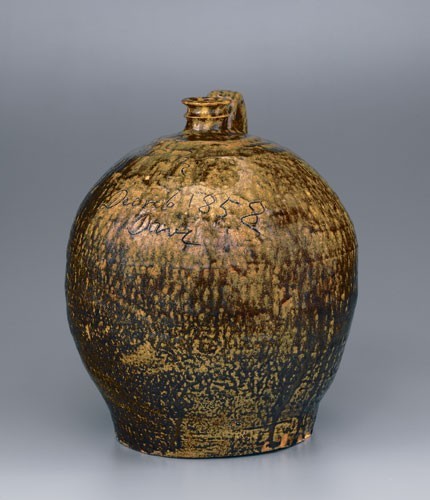
Jug, Lewis Miles pottery, 1858. Alkaline-glazed stoneware. H. 13". Incised in script on shoulder: “Lm Decr 6 1858 Dave.” (Courtesy, Katie Green.)
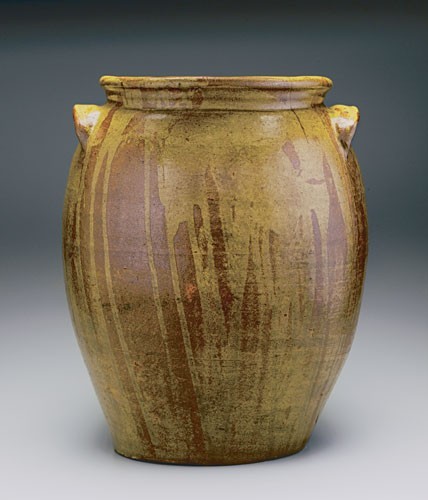
Storage jar, Lewis Miles pottery, 1858. Alkaline-glazed stoneware. H. 21 1/2". Incised in script on shoulder: “Lm Feb 15 1858” and fourteen punctates. (Courtesy, Lindsay Green.)
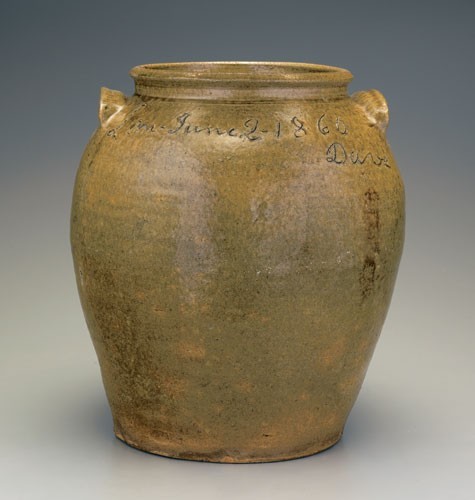
Storage jar, Lewis Miles pottery. Alkaline-glazed stoneware. H. 15 1/2". Incised in script on shoulder: “Lm – June 2 – 1860 Dave”; on opposite side: “X.” (Courtesy, Larry and Joan Carlson.)
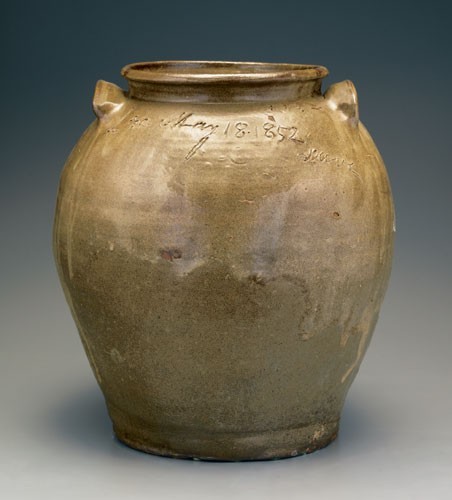
Storage jar, Lewis Miles pottery, 1852. Alkaline-glazed stoneware. H. 17". Incised in script: “Lm May 18 1852 Dave”; on opposite side: backward C and seven punctates. (Courtesy, Larry and Joan Carlson.)
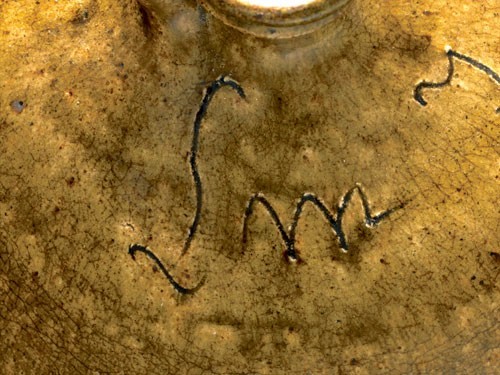
Detail of the inscription on the shoulder of the jug illustrated in fig. 15.
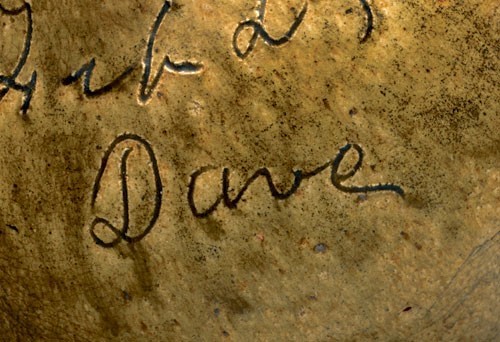
Detail of the inscription on the shoulder of the jug illustrated in fig. 32.
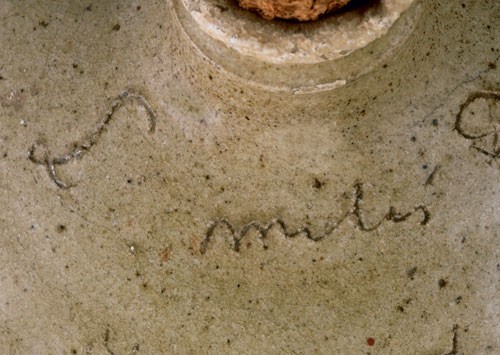
Detail of the signature on the shoulder of the jug illustrated in fig. 15.
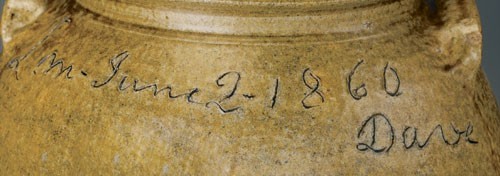
Detail of the inscription, date, and signature on the shoulder of the storage jar illustrated in fig. 21.
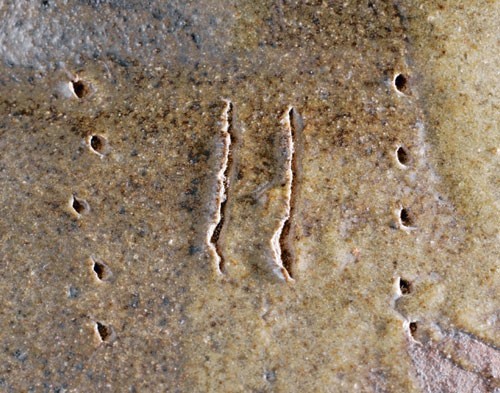
Detail of the two slash marks and ten punctates on the shoulder of the storage jar illustrated in fig. 18.
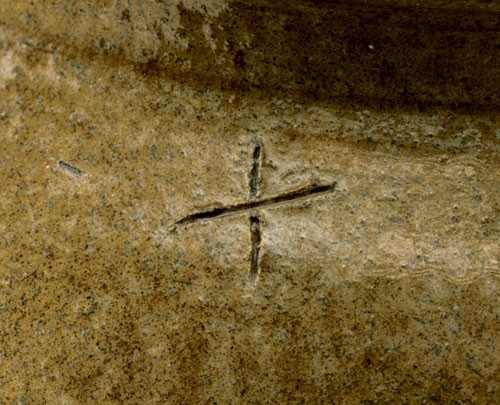
Detail of the X on the shoulder of the reverse side of the storage jar illustrated in fig. 21.
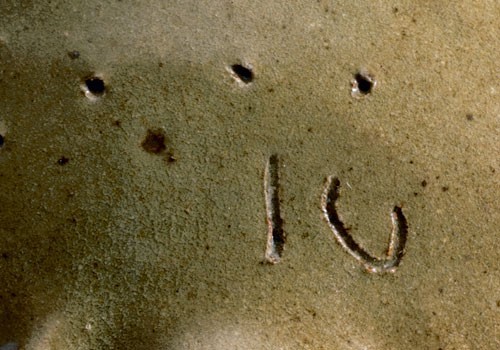
Detail of the four punctates, slash, and U on the shoulder of the jug illustrated in fig. 31
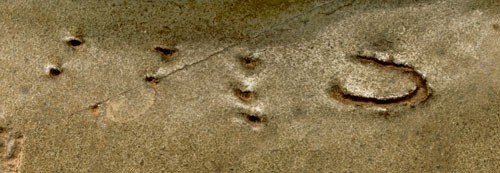
Detail of the backward C and seven punctates on the shoulder of the storage jar illustrated in fig. 22.
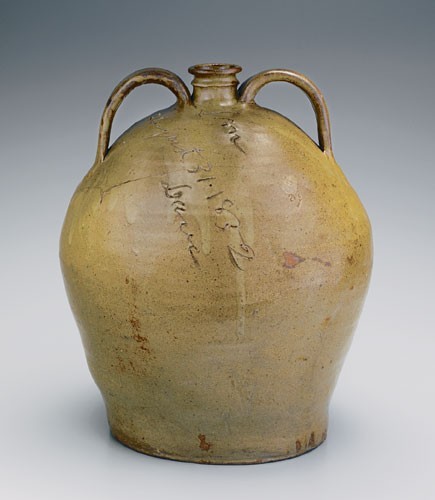
Double-handled jug, Lewis Miles pottery, 1852. Alkaline-glazed stoneware. H. 16". Incised in script: “Lm August 31·1852 / Dave”; on opposite side: slash and U marks with four punctates. (Courtesy, James and Mary Smith.)
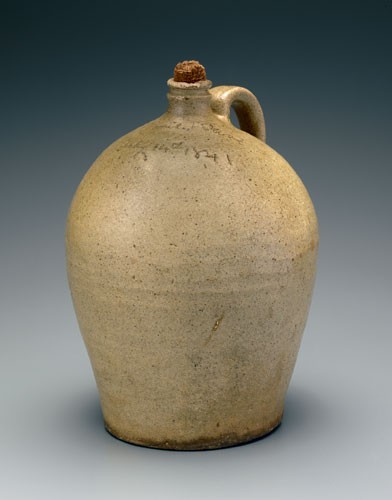
Jug, Lewis Miles pottery, 1841. Alkaline-glazed stoneware. H. 14 1/2". Incised in script on the shoulder: “Feby 14th 1841 L miles Dave” and two slash marks. (Courtesy, James and Mary Smith.)
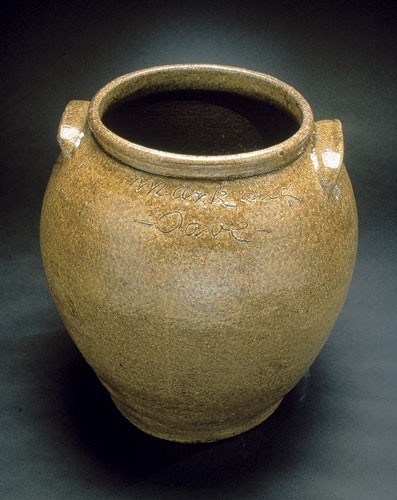
Storage jar, Lewis Miles pottery, 1859. Alkaline-glazed stoneware. H. 15". Incised in script: “Mark and/ –Dave–” and two slash marks; on opposite side: “Lm. March 10·1859.” (Courtesy, Museum of American History, Division of Ceramics and Glass, Smithsonian Institution, Washington, D.C.)
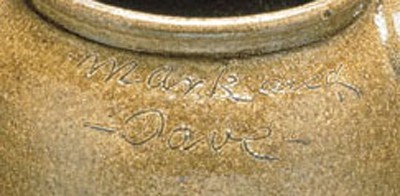
Detail of the signature on the shoulder of the storage jar illustrated in fig. 33.
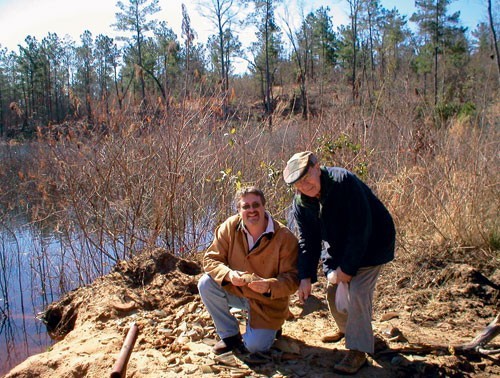
The authors at the Lewis Miles pottery site at Stoney Bluff
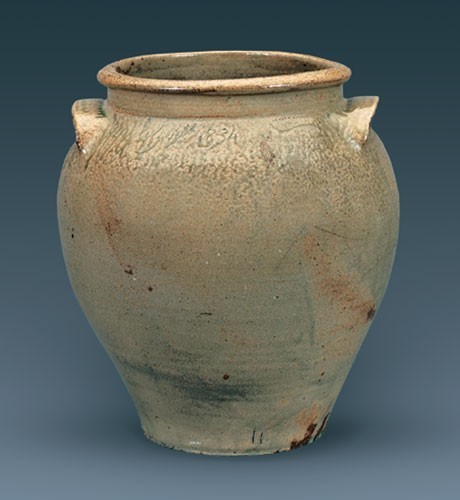
Storage jar, Pottersville pottery, 1834. Alkaline-glazed stoneware. H. 19 1/2". Incised in script at shoulder: “Put every bit all between / surely this jar will hold 14”; on opposite side: “July 12th 1834” and fourteen punctates; at base: two slash marks. (Courtesy, South Carolina State Museum, Columbia.)
